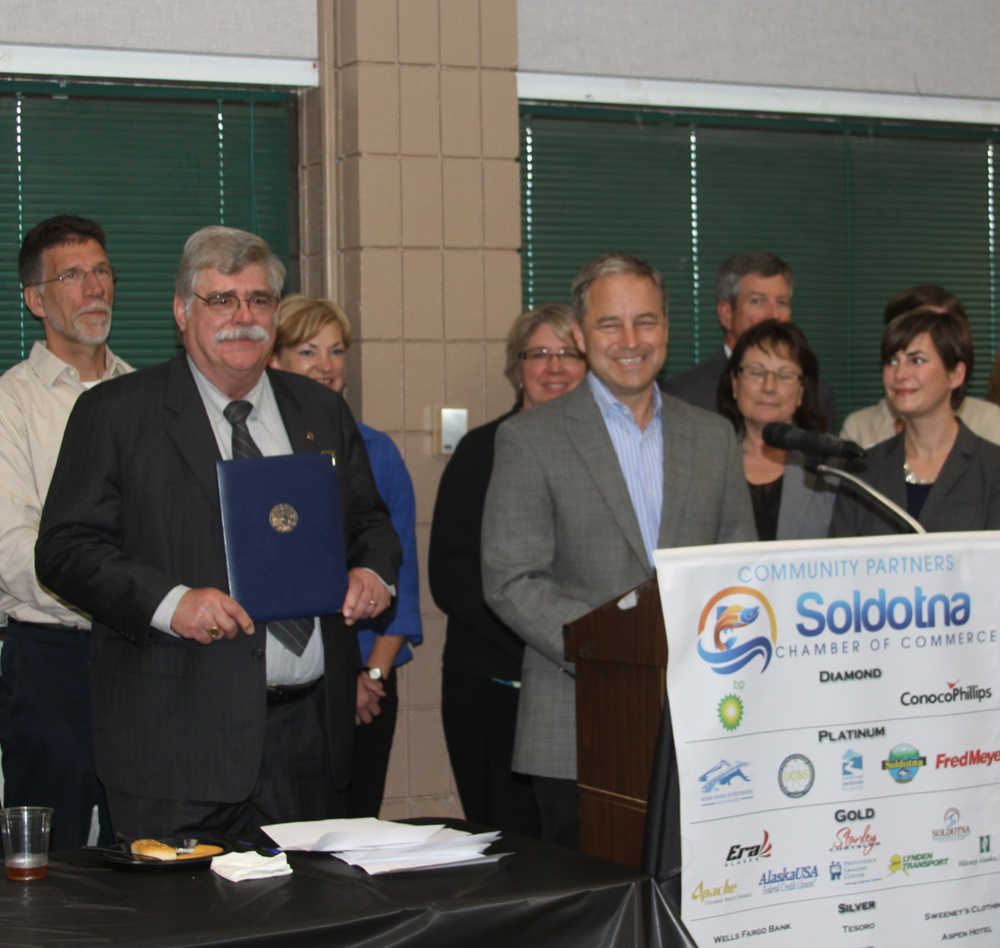The Governor of Alaska Sean Parnell has been on the Kenai Peninsula a lot this summer and it hasn’t been the fishing that has brought him here. At a joint Soldotna and Kenai Chamber of Commerce meeting at the Soldotna Regional Sports Complex last week the governor was on hand to do what only he can do with the swipe of a pen, make legislation become law. Before officially inking his signature to 11 pieces of legislation sponsored by local legislators, the governor spoke about the Funny River Horse Trail wild fire. “The rest of the country is looking at the Kenai Peninsula community and the recent wildfire and seeing it as a model of cooperation that was very effective. When you look at how the community came together and worked not only as a local community, but as borough, city, state and federal government as well as firefighters and equipment that was brought in from the lower 48 and Canada, the results of which fortunately was a good outcome with no primary structures lost to a significant wildfire of nearly 200,000 acres. The praise has come in from every level, the fire crews who were on the ground were complementary as to how Peninsula residents stepped up to accept help and to be a help to each other during the times before, during and following the evacuation and that’s something I wanted to pass on here today. I was told by first responders that many times in other states property owners don’t even welcome firefighters on to their property to help them save their property. This community has made all Alaskans proud,” Parnell told the several hundred who gathered for the bill signing ceremony.
Parnell was also complimentary of the local legislative delegation and the support local citizens provided them in passing the legislation that he came to sign into law, “Your Peninsula delegation is a strong delegation that works well together and with others. I come to the local communities to sign bills so the people of that community have a better understanding of the legislation and an appreciation for those who worked to have it enacted. We passed like 118 bills this session and most people have no idea why or what happened,” he said. Of the 11 bills signed Rep. Kurt Olson was the most prolific with legislation that he shepherded through the lengthy process, “Some of these bills took four years to get to this point, even though one was only three and a half pages it took that much work to get to the point where they could be signed. Another was a problem brought to me by Dr. Nels Anderson four years ago with a problem that was affecting all doctors, nurses and medical practitioners. After talking extensively with other physicians I learned that Alaska was one of 20 states that didn’t allow physicians, practitioners or staff to talk with a family after a procedure in the hospital where a patient may die or other side effects. With this law doctors may now talk with the patients and family and express sympathy or condolence without prejudicing themselves. It became known as the ‘I’m sorry bill’ and it has a positive impact both on the families and the medical professionals,” explained Olson.
Sen. Micciche had a bill signed dealing with contractors that hadn’t been updated since 1983. “SB # 71 is a law that’s a boost for commercial fishing families which are still the number one employer in the state and simplifies their tax structure while expanding the Alaska salmon development tax credit, which will help bring jobs back here where Alaskan hands will finish our seafood products before they go to the table. Then SB 193 is important for consumer protection which was last addressed in 1982 and increases the level of protection for the consumer as well as protecting contractors if one contractor decides to default on performance it increases the bond limit so other contractors can collect. This bill was brought forth by the Association of General Contractors and basically adjusted for inflation. Both these bills I believe will lead to more jobs for Alaskans and more industry to create those jobs. I was happy the Governor came to Soldotna to sign them into law,” said Micciche.

